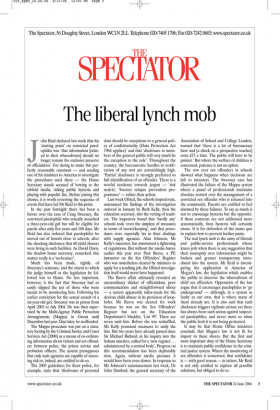The liberal lynch mob
John Reid declared last week that his ‘starting point’ on convicted paedophiles was ‘that information [related to their whereabouts] should no longer remain the exclusive preserve of officialdom’. For daring to make this perfectly reasonable comment — and sending one of his ministers to America to investigate the procedures used there — the Home Secretary stands accused of bowing to the tabloid media, risking public hysteria and playing with populist fire. Before joining this chorus, it is worth reviewing the sequence of events that have led Mr Reid to this point.
In the past fortnight there has been a furore over the case of Craig Sweeney, the convicted paedophile who sexually assaulted a three-year-old girl but will be eligible for parole after only five years and 108 days. Mr Reid has also ordered that paedophiles be moved out of hostels close to schools, after the shocking disclosure that 60 child abusers were living in such facilities. As David Davis, the shadow home secretary, remarked, this matter really is a ‘no-brainer’.
Much has been made, rightly, of Sweeney’s sentence, and the extent to which the judge himself or the legislation he followed was to blame. No less important, however, is the fact that Sweeney had so easily slipped the net of those who were meant to be monitoring him. Following his earlier conviction for the sexual assault of a six-year-old girl, Sweeney was in prison from April 2003 to July 2004. He was then supervised by the Multi-Agency Public Protection Arrangements (Mappa) in Gwent until December last year. Days later, he reoffended.
The Mappa procedure was put on a statutory footing by the Criminal Justice and Court Services Act (2000) as a means of co-ordinating information about violent and sex offenders between police, the prison service and probation officers. The system presupposes that only such agencies are capable of assessing risk or, indeed, are entitled to do so.
The 2005 guidelines for Kent police, for example, state that ‘disclosure of personal data should be exceptions to a general policy of confidentiality (Data Protection Act 1984 applies)’ and that ‘disclosure to members of the general public will very much be the exception to the rule’. Throughout the country, the bureaucratic hurdles to notification of any sort are astonishingly high. ‘Partial’ disclosure is strongly preferred to full identification of an offender. There is a woeful tendency towards jargon — ‘risk matrix’, ‘booster relapse prevention programmes’ — rather than action.
Last week Ofsted, the schools inspectorate, announced the findings of the investigation ordered in January by Ruth Kelly, then the education secretary, into the vetting of teachers. The inspectors found that ‘hardly any’ schools took ‘even the simplest of measures in terms of record-keeping’, and that procedures were especially lax in their dealings with supply agencies. Alan Johnson, Ms Kelly’s successor, has announced a tightening of regulations. But without the media furore earlier this year over Paul Reeve, a PE instructor on the Sex Offenders’ Register who was nonetheless cleared by ministers to apply for a teaching job, the Ofsted investigation itself would never have happened.
The Reeve affair ultimately revealed an extraordinary thicket of officialdom, poor communication and straightforward idiocy — a system apparently tailor-made for the devious child abuser in its provision of loopholes. Mr Reeve was cleared for work because he was on the Sex Offenders’ Register but not on the Education Department’s blacklist, ‘List 99’. There are seven such lists. Before she was reshuffled, Ms Kelly promised measures to unify the lists. But two years have already passed since Sir Michael Bichard, in his inquiry into the Soham murders, called for a ‘new register ... administered by a central body’. Progress on this recommendation has been deplorably slow. Again, without media pressure it would have been even slower. In response to Mr Johnson’s announcement last week, Dr John Dunford, the general secretary of the Association of School and College Leaders, warned that ‘there is a lot of bureaucracy here and [a check on a prospective teacher] costs £53 a time. The public will have to be patient.’ But where the welfare of children is concerned, patience is not an option.
The row over sex offenders in schools showed what happens when decisions are left to ministers. The Sweeney case has illustrated the failure of the Mappa system where a panel of professionals maintains absolute control over the management of a convicted sex offender who is released into the community. Parents are entitled to feel alarmed by these failures. To say as much is not to encourage hysteria but the opposite: if these concerns are not addressed more systematically, then hysteria will certainly ensue. It is for defenders of the status quo to explain how to prevent further panic.
The real lynch mob is the army of liberals and public-service professionals whose knees jerk when there is any suggestion that their monopoly over information might be broken and greater transparency introduced into the system. Mr Reid is investigating the application in America of Megan’s law, the legislation which enables the public to discover the whereabouts of child sex offenders. Opponents of the law argue that it encourages paedophiles to ‘go underground’ — although, in a system as faulty as our own, that is where many of them already are. It is also said that such disclosure triggers vigilante action; yet there has always been such action against suspected paedophiles, and never more so when the public feels it is not being protected.
It may be that Home Office ministers conclude that Megan’s law is not fit for import to these shores. But the first and most important duty of the Home Secretary is to maintain public confidence in the criminal justice system. Where the monitoring of sex offenders is concerned, that confidence is — with good reason — in tatters. Mr Reid is not only entitled to explore all possible solutions, but obliged to do so.



















































 Previous page
Previous page